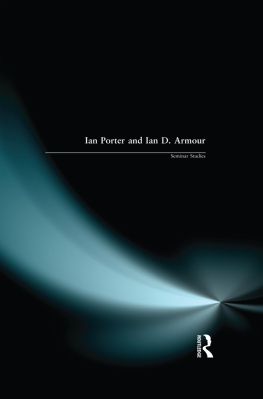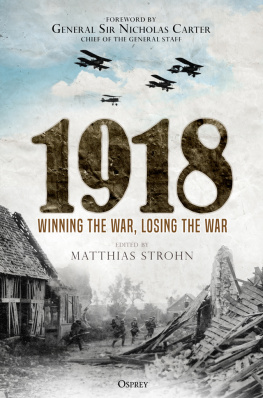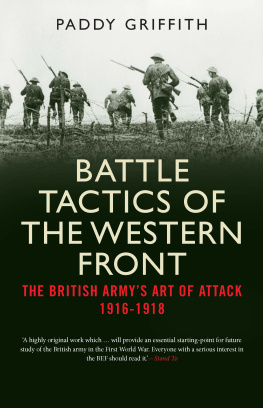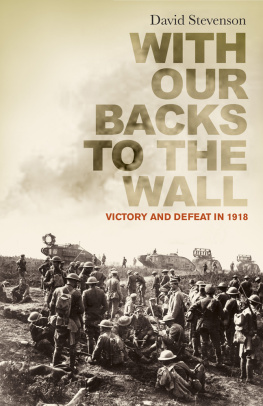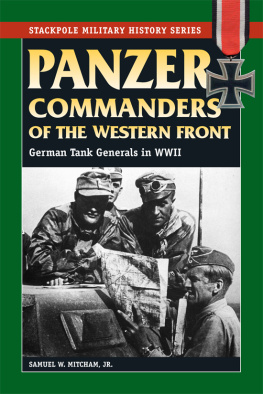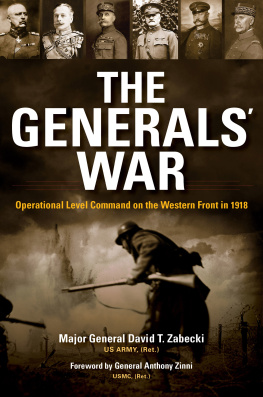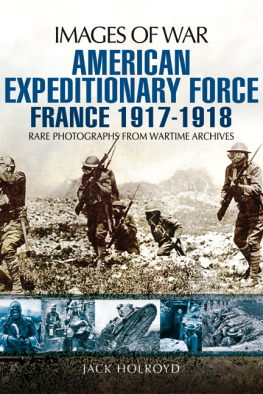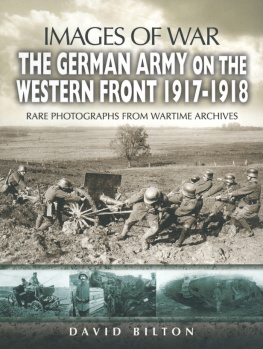MAJOR BATTLES AND CAMPAIGNS
John S. D. Eisenhower, General Editor
I. The Defeat of Imperial Germany, 1917-1918
by Rod Paschall
Introduction by John S. D. Eisenhower
II. Battles of the Revolutionary War, 1775-1781
by W.J. Wood
Introduction by John S. D. Eisenhower
III. Amateurs, to Arms! A Military History of the War of
1812
by John R. Elting
IV. World War II in the Mediterranean, 1942-1945
by Carlo DEste
Introduction by John S. D. Eisenhower
THE DEFEAT OF
IMPERIAL GERMANY
1917-1918
By Rod Paschall
Colonel, United States Army
With an Introduction by
John S. D. Eisenhower

Algonquin Books of Chapel Hill
Published by
Algonquin Books of Chapel Hill
P.O. Box 2225
Chapel Hill, North Carolina 27515
A division of
Workman Publishing
225 Varick Street
New York, New York 10014
Copyright (c) 1989 by Rod Paschall. All rights reserved.
Library of Congress Cataloging-in-Publication Data is available.
eISBN 978-1-61620-410-5
This book is dedicated to infantrymen,
particularly those who fought for their nations
in the Great War.
CONTENTS
LIST OF ILLUSTRATIONS
Between pages 44 and 45
Between pages 76 and 77
Between pages 140 and 141
Between pages 204 and 205
LIST OF MAPS
INTRODUCTION
by John S. D. Eisenhower
THOSE OF US OLD ENOUGH TO REMEMBER the period just following World War I will recall the great dichotomy of views that the American people held toward that conflict. On one side were the romantics, the survivors who took justifiable pride in having risked their lives for their country and returned safely. To them and to a grateful public, convinced for a time that it had been the war to end wars, the conflict was the Great War, great in every respect. Happy stories of Gay Paree, of a mythical Mademoiselle from Armentires, and of the kindnesses of the French peasants toward American soldiers abounded. Songs such as Over There, Goodbye Broadway, Hello France, and Oh How I Hate to Get Up in the Morning were still popular. Many brave men had lost their lives in World War I, to be sure, but their sacrifices had made all Americans somehow more heroic.
But by the 1930sa period I personally remember welldisillusionment had set in. Novels such as Hemingways A Farewell to Arms and Remarques All Quiet on the Western Front made inroads into the public consciousness. Spurred by the Great Depression, which drastically lowered spirits, the veterans of the Great War became pictured as victims, their plights represented by the celebrated Bonus Marchers, who descended upon the nations capital in 1932. And the fear that the Great War might not, after all, have been the war to end wars, caused dread. One group, anticipating a fate similar to the veterans of World War I, dubbed themselves the Veterans of Future Wars, seriously demanding bonuses in advance, before they should be killed in a coming conflict.
Then, at the end of the 1930s, the memory of the Great War was set aside in the agony of a second, even more destructive event, World War II. As a result, the Great War was removed from memory. Events that should have been soberly evaluated were put aside, stamped for future reference (if needed), with labels based upon the prejudices of each individual. World War I became the Forgotten War.
Without a doubt, a contributing factor in the erasure of the Great War from human memory lies in its very horror. An estimated nine million soldiers died in that war, and the carnage turned out to be in vain: victory enabled the Allies to impose the Versailles Treaty on Germany, a dictated peace that was so ambivalentvengeful in spirit, but not sufficiently harsh to keep Germany in subjugationas to constitute a direct cause for the rise of Hitler in Germany and another global tragedy. Thus the futility, the feeling that the sacrifices of World War I were in vain, has penetrated the human mind even more than have the numbers killed and maimed.
Even the books of history tend to follow this pattern. Outrage over the mass sacrifice of a futile war encouraged military writers such as B. H. Liddell Hart to treat nearly all the Allied generals with a lofty contempt that they did not really deserve. It is puzzling, when one examines Liddell Harts history of the war (1930), that so many unimaginative, mediocre minds could be assembled on one side in any war.
Rod Paschall, in this book, has attempted successfully to give a more balanced perspective on the last two years of World War I. Rather than treat the horrors as the product of inferior minds, he assumes the existence of the problem of stalemate along the line from Switzerland to the English Channel, and then examines how various generals, men as capable as those who achieved fame later in World War II, tried unsuccessfully to solve it.
Colonel Paschalls independent, original approach is well taken. He deftly sets out the military situation as it was seen by both sides on New Years Day 1917, by pointing out that the stalemate on the critical Western Front could be broken only by one of three means: (1) a negotiated peace; (2) the reestablishment of maneuver on the battlefield by the discovery of some way of penetrating the long trench lines; and (3) by attrition. A negotiated peace he quickly rules out, leaving the problem of attaining military victory that of achieving a breakthrough and thus avoiding attrition as the means of resolution. (Attrition, unfortunately, prevailed.)
In so doing, Paschall gives justice to all. There are no villains in this book, he says. He outlines the efforts of the optimistic French general Robert G. Nivelle in his hopes to break through in the Champagne region of France with one hundred divisions, backed up by a British effort both north and south of the Somme. He describes how the German general, Erich von Ludendorff, anticipated these Allied plans and defeated them with a new tactic, the reverse slope defense. He describes with sympathy the frustration of British general Sir Douglas Haig, in attempting to supplement his attack against Ypres and Passchendaele in the Flanders lowlands with an amphibious landing in the North Sea. He gives French general Ferdinand Foch credit for helping to save a desperate Italian army after its defeat at Caporetto. He describes the American role, from Ludendorffs spring offensive in 1918 to the battles of St. Mihiel and the Argonne Forest. In the latter he is frank; though he treats the American contribution with charity, he holds no brief for any romantic notion that one American could lick ten Germans.
Throughout he is professional but readable. He delights in puncturing myths such as the stupidity of all the generals, the alleged rigidity of the German General Staff (which he describes as a meritocracy), and the supposed superiority of autocracies over democracies in fighting long wars of attrition. And besides puncturing myths, Paschall points out the continuum between the fighting techniques of the end of World War I and the beginnings of World War II. Without detracting from the abilities of the generals of the latter war, he contends that those of the former were equally imaginative; they were simply faced with an impossible problem.
Rod Paschall has exceptional qualifications to make the judgments he does. He has been a member of the Army Special Forces (Green Berets), a decorated combat veteran of five campaigns in Vietnam, a graduate of the U.S. Naval War College, and an instructor in military history at the U.S. Military Academy (where he graduated in 1959). He holds masters degrees in international affairs (George Washington University, 1970) and in American history (Duke University, 1971). He is currently the director of the U.S. Army Military History Institute, Army War College, Carlisle, Pennsylvania.
Next page

